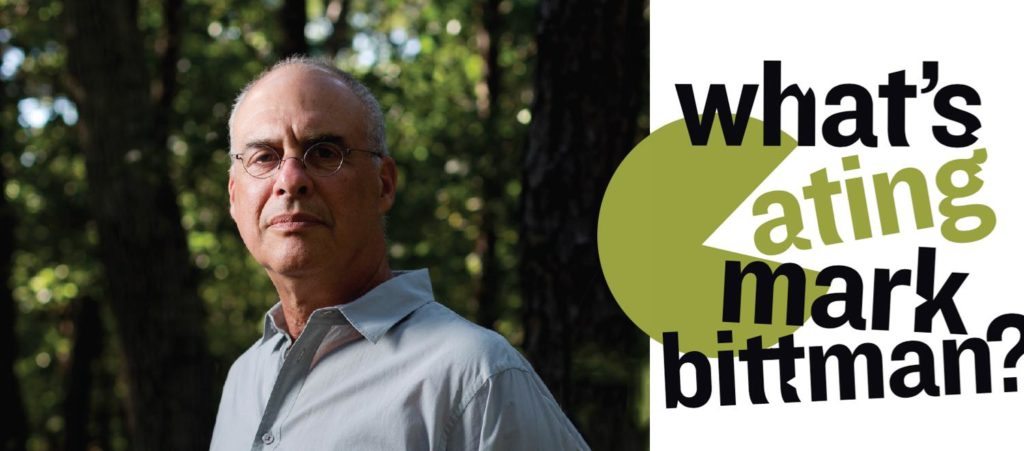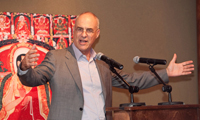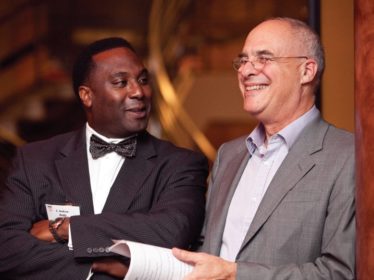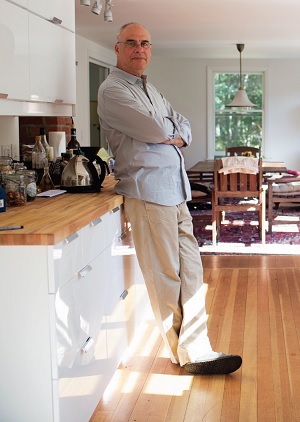What’s eating Mark Bittman?

New York City mayor Michael Bloomberg came under fire this spring, which is hardly an unusual circumstance for the leader of the country’s largest and most complicated city. But the reason for the intense vitriol directed his way had nothing to do with Bloomberg battling public- employee unions or slashing social-service budgets. His perceived sin was proposing a limited ban on the sale of sugar-sweetened beverages greater than 16 ounces. If the law were enacted, waistline-expanding mega-cups of soda and other sugary drinks would be a thing of the past at a variety of city venues.

The outcry was fast and furious. The American Beverage Association accused Bloomberg of restricting freedom of choice; other pundits blasted the mayor for promoting a “nanny state,” an angle of attack exacerbated by his earlier ban on transfats from restaurant food.
Mark Bittman was having none of it.
In his New York Times column, Bittman noted that sugar-sweetened beverages account for a full 7 percent of the typical American’s caloric intake, and that obesity-related health-care costs are at $147 billion and climbing. Soda, he argued, is simply a sugar-delivery system — it is not food any more than cigarettes, beer or heroin are food. The ban? Fine by him.

“We should be encouraging people to eat real food and discouraging the consumption of non-food,” he wrote. “Pretending there’s no difference is siding with the merchants of death who would have us eat junk at the expense of food and spend half our lives earning enough money to deal with the health consequences.”
Such unvarnished candor is typical of Bittman. The veteran Times food guru and bestselling author — whose columns and books have guided millions in the kitchen — migrated to the newspaper’s op-ed pages in 2010 specifically to address the government policies, corporate machinery and marketing sleight-of-hand that are shaping, and warping, the American food system. His 2009 book, “Food Matters: A Guide to Conscious Eating,” is a clarion call about the disastrous impact of factory farming on health and the environment (not to mention the animals) and America’s unchecked abandonment of “sane” eating habits in favor of a diet heavy on refined carbohydrates and meat.
“We’re obviously on an unsustainable course,” Bittman says in an interview by phone from his summer home on Cape Cod. “Though I tend to be lighthearted, and the sky isn’t in fact falling, things are not good. There are two big issues we’re facing: the overproduction and overconsumption of meat, and the overconsumption of sugar. The goal is to disincentivize the eating of bad food, and incentivize the eating of good food.”
*******
Mark Bittman’s relationship with food was much like that of many other first-year students when he arrived at Clark University in 1967. He once told an interviewer that he began cooking at college “out of self-defense” because of the bland cafeteria offerings.
“Oh, it wasn’t Clark’s fault,” he says today with a laugh. “Cafeteria food in general was pretty abysmal back then. I mean, at first it was exciting because you could get anything you wanted, and that quickly devolved into Cokes, cheeseburgers and vanilla ice cream. Freshman year, dietarily speaking, was the worst year of my life.”
He moved off campus as a sophomore and by necessity began cooking for himself. “I was vaguely interested in cooking, but it was certainly nothing that thoughtful, nothing approaching a passion,” he recalls. His roommate, a part-time short-order cook, taught him a few things, and he found further inspiration from kitchen-savvy roommates when he returned to his native New York to do his junior year at New York University. By the time he returned to Worcester for his senior year in the fall of 1970, “I was really into cooking. I tackled Indian food, seafood, Japanese food — whatever appealed to me.”
Bittman graduated with a psychology degree in 1971, but remained in Worcester for another nine months. He drove a cab and taught classes at Clark under a program that allowed students and recent grads to be instructors. (“A class in anarchism — that was what I taught.”) He left town with his girlfriend (and later wife) for Somerville, Mass., where for about nine years he drove a truck, taught high school and found himself again behind the wheel of a cab.
Energized by the tumultuous politics of the time, Bittman became a community organizer, agitating for rent control, women’s rights and fair welfare benefits, and defending — sometimes physically — the Haitian immigrants who’d moved into Somerville’s neighborhoods to an unwelcoming response. The social causes he championed found voice in a small scrappy newspaper that Bittman and other volunteers published. “It was basically a propaganda sheet, and we were beneath nonprofit, but it was real enough for me to become familiar with the vernacular of newspapers,” he says. “The paper served me really well because I learned how to deal with everything from printers to photography to the so-called technology of the time.”
******

In 1978, when the first of his two daughters was born, Bittman and his family moved to New Haven, Conn.
“I’d been working for nearly no money for many years, and clearly it was time for me to find a real job. The country was in a recession at the time and I was shocked that I couldn’t find work. I thought I was so talented and so smart anyone would want to hire me,” he laughs. “Not the case.” As he’d done in Worcester and Somerville, Bittman found a way to stay financially afloat, this time by selling photography equipment.
Cooking remained a constant in his life, and as he built his repertoire in his home kitchen, Bittman knew he wanted to write about food. In 1980, on the advice of a friend, he approached the editor of The New Haven Advocate, an alternative newsweekly, and made two blunt observations: The paper’s restaurant reviewers were terrible, and the job should be his.
“He said, ‘All right, you write something, and if it’s better, you can do it.’ My arrogance, I have to say, paid off.”
Connecticut’s relatively tight media circle worked to his favor. As Bittman’s reputation grew he began writing for The Hartford Courant as well as The Advocate, and then became Connecticut Magazine’s restaurant critic.
In 1997, The New York Times hired Bittman to write The Minimalist column. His unfussy recipes and wit-spiced narratives quickly earned him a devoted following and served as a roadmap for eating well. One reporter tagged him “the self-taught champ of culinary simplicity.”
A year later saw the publication of his book, “How to Cook Everything,” the culmination of a four-year odyssey that began when Bittman agreed to author a volume in which he discussed cooking from a very personal perspective, an approach he’d admired in the seminal “Joy of Cooking” but found lacking in a subsequent edition. Researching, composing, revising and bringing his book to market was as all-consuming as the title suggests.
“Writing the book led to many unpredictable, and some unwanted, consequences,” he acknowledges. “I didn’t have much of a life beyond cooking and writing. I’d be up at five and worked until eight or nine every night. I think I kept up my obligations as a parent, and I certainly did all the cooking at home, but I wasn’t as present for my kids during those years as I was earlier and later.”
“How to Cook Everything” not only sold better than expected, but has become a staple in American kitchens. (He’s written several follow-ups, including the newly published “How to Cook Everything: The Basics.”) Bittman calls it the “single best piece of work I’ve ever done and will ever do.”
The twin successes of “Everything,” and his popular Times column gave Bittman his first tangible financial security.
“After seventeen years of wondering where the next check was going to come from, being hired at The Times and having ‘How to Cook Everything’ published marked some measure of success,” he says. “From there, it seemed likely things would be all right. But it had been almost twenty years by that point — a slow and steady crawl.”
******
He was happy writing about food. For more than 13 years his Minimalist columns were a necessary read, and a vicarious thrill, for foodies who wanted to see where Bittman would take them next. The work gave him an opportunity to travel and cook alongside some of the world’s great chefs. In 2008 he hit the road with actress Gwyneth Paltrow and celebrity chef Mario Batali for a 13-part PBS TV series exploring the culinary riches of Spain. Life was good.
But he was wary of stagnation. Always something of a political animal, Bittman saw a need to talk about the destructive trends in the American food system that have led to alarming increases in obesity, diabetes and heart disease, and which contribute to the planet’s environmental distress. “Nobody should write a food column for more than ten years,” he says. “I was angling for ways to change it, but the people in control weren’t interested in that. So I went to other people at The Times and said I have more interesting things to say than what I’m saying in the column.”
He was steered to the Week in Review section (now Sunday Review), where a few times a year he offered deep analysis on such topics as factory farming and the decline of once-abundant fish species. After two years of continuing with the Minimalist columns and his Review pieces, Bittman approached the opinion page editor about creating a food column suitable for the op-ed pages, one that would offer timely commentary about the American food system — what’s wrong with it, ways to make it better, and the heroes and villains battling over the contents of the nation’s tables. The Times seized on the idea, and from September 2010 to early 2011 Bittman transitioned from The Minimalist to the Opinionator.
The shift has given Bittman a forum to critique Big Food, the industrial-agricultural complex that he sometimes compares to Big Tobacco for its rapacious self-interest and disregard for the public good. Many of his best writings punch holes in common notions and practices, offering counterintuitive challenges to decades of accepted wisdom. He’s delivered a withering assessment of the traditional food pyramid, unraveled the sometimes unholy alliances between government agencies and the food corporations they monitor, and took on the American Dairy Association’s assertions about the importance of milk in the diet. (Not only are the essential nutrients available elsewhere, Bittman explains, but no other species on earth drinks the milk of another species.)
He’s just as eager to point out examples of progress. At the time of this interview, Bittman was enthused about two recent developments: Disney’s announcement that it would no longer accept advertising for junk food targeted at children, and a promise by McDonald’s to phase out the use of gestation crates that immobilize sows while they’re pregnant.
“When McDonald’s says it’s banning gestation crates, it may not be a life-changing thing, but symbolically it’s huge,” Bittman says. “It shows the pendulum swinging a bit. At least these corporations are giving lip service to doing better, and if we hold their feet to the fire they’ll carry through on this stuff and then they’ll be forced to take the next step.”
In an Opinionator column Bittman noted that the rate of U.S. meat consumption, surprisingly, showed a recent decline. He’s long made it clear that industrial livestock production is creating a world of ravenous meat eaters with accompanying health and environmental impacts (one-fifth of greenhouse gas emissions is traced to factory farming) and he’s not afraid to be provocative to get the message across. He memorably introduced a 2008 lecture — one of the popular TED Talks — by showing a slide of a cow and announcing, “This, is this year’s version of this …” followed by a slide of a mushroom cloud.
******
 Bittman tends to illuminate rather than excoriate (unless it’s warranted); counsel rather than nag. He detests overly prescriptive diets, and simply recommends eating more fruits, vegetables, legumes and whole grains, and less meat, sugar, junk food and overrefined carbohydrates. He talks of food that’s “real” and “normal,” and of the lost art of preparing meals at home, an unfortunate byproduct of convenience and packaging.
Bittman tends to illuminate rather than excoriate (unless it’s warranted); counsel rather than nag. He detests overly prescriptive diets, and simply recommends eating more fruits, vegetables, legumes and whole grains, and less meat, sugar, junk food and overrefined carbohydrates. He talks of food that’s “real” and “normal,” and of the lost art of preparing meals at home, an unfortunate byproduct of convenience and packaging.
Personally, he observes a strict vegan regimen before 6 p.m., but in the evening allows himself anything he wants within reason — over time he’s found himself naturally attracted to healthier options post 6 p.m. The ultimate benefit is that he’s shed 35 pounds since adopting this eating plan seven years ago — aided by long-distance running — and has kept the weight off.
Not that it’s always easy. Bittman has confessed to the allure of a Gray’s Papaya hot dog, a New York guilty pleasure, and of avoiding a certain subway stop near a pizza joint whose slices call out to him. There’s nothing wrong with indulging now and then, he insists, as long as you return to dietary moderation once you’ve satisfied the craving.
There is reason to hope that the American food system will improve, Bittman says. He cites an emergent, if fragmented, movement in the country that’s embodied by individuals who are trying to eat more healthily and cook their own meals. Some people may focus on their children’s diets, perhaps others are most concerned with organic farming, and still others are taking pains to buy locally produced food whenever possible.
“It does take me back to 1970 when I came back to Clark,” he says. “I got together with a bunch of friends and we were talking about all the protesters — women’s rights people, black-power people, anti-war people, new-ecology people — and how our job as people who knew everything [he laughs] was to make everyone see that it was one struggle.
“The food scene is similar now. There are many different targets, but beyond those targets there are only a few puppet masters, only a few entities making the food system work against our best interests rather than for our best interests. So whether you’re concerned about what you’re putting in your body, or what they’re putting on crops, or climate change, or labor, or water quality, it’s pretty much the same struggle.”
Will it take some devastating event to effect a major overhaul of the American diet? A moment in time when resources run out and the delivery system collapses? A food-pocalypse, as it were?
“Will nothing get fixed until there’s a catastrophe? That’s a bigger question than just a food question — it applies to so many things,” Bittman says.
“Look, there’s been progress, and there’s reason to believe there will be more progress. Does this take ten years, twenty years, fifty years? Does it take that catastrophe? No one knows. The ‘bad food’ scene is relatively young, and the ‘let’s make food better’ scene is even younger. In the U.S. right now, things are getting somewhat better. I think we’ve had an impact.”


